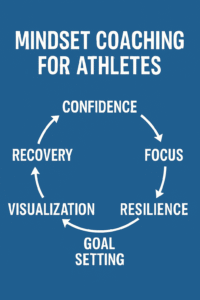
Mindset Coaching for Athletes: The Ultimate Game-Changer
Ever wonder why some athletes shine under pressure while others crumble? Talent and training matter, sure—but the real game-changer? Mindset. That’s where mindset coaching for athletes comes into play. It’s more than just thinking positive—it’s a strategic approach to mental performance that can take your game to the next level.
Understanding the Athletic Mindset
Fixed Mindset vs Growth Mindset
A fixed mindset believes abilities are static. If you’re good, great. If not, tough luck. A growth mindset, on the other hand, thrives on challenges and sees failure as a stepping stone. Mindset coaches help athletes transition from fixed to growth, unlocking true potential.
How Beliefs Shape Performance
What you believe, you become. If you think you’ll choke under pressure, chances are—you will. But flip that narrative and tell yourself you’ve trained for this? Boom—confidence activated.
Common Mental Blocks in Athletes
From self-doubt and fear of judgment to obsessing over perfection—mental blocks can sideline even the most talented athletes. Coaching helps untangle those thoughts and redirect them.
The Role of Mindset Coaching
What Does a Mindset Coach Do?
A mindset coach works with athletes to build mental resilience, develop coping strategies, boost confidence, and maintain motivation. They’re part strategist, part motivator, and part therapist—all rolled into one.
Mindset Coach vs Sports Psychologist
While both focus on mental health and performance, sports psychologists deal with clinical aspects like anxiety or depression. Mindset coaches focus on goal achievement and performance optimization.
Real-World Examples of Mindset Shifts
An amateur runner struggling with pace transformed his self-image using affirmations. A gymnast battling fear of failure overcame it through visualization. Mindset changes everything.
Key Benefits of Mindset Coaching for Athletes
Improved Focus and Concentration
Mindset coaching trains athletes to eliminate distractions and stay locked in. Think: sniper focus on the field, court, or track.
Enhanced Resilience and Mental Toughness
When the going gets tough, mentally strong athletes keep going. Resilience isn’t just a trait—it’s a trainable skill.
Greater Confidence Under Pressure
Confidence is the silent muscle behind every bold move. Coaches instill belief through repetition, wins, and micro-goals.
Better Goal Setting and Achievement
Forget vague goals like “get better.” Mindset coaching sets specific, measurable, and actionable goals—and helps you hit them.
Techniques Used in Mindset Coaching
Visualization and Mental Imagery
Athletes mentally rehearse success scenarios to trick the brain into feeling confident and prepared.
Positive Self-Talk and Affirmations
Words are powerful. Swapping “I can’t” for “I’ve got this” rewires thinking patterns.
Mindfulness and Meditation
Staying present in the moment prevents spiraling thoughts. Even five minutes of deep breathing can shift your mindset.
Journaling and Reflection Exercises
Writing helps process emotions, track progress, and identify mental patterns. It’s like a mirror for your brain.
Common Challenges Faced by Athletes
Fear of Failure
One of the biggest mental roadblocks. Coaching helps athletes redefine failure as feedback.
Performance Anxiety
Pressure is inevitable, but panic is optional. Coaches teach breathing techniques and mindset anchors to stay calm.
Burnout and Motivation Issues
Burnout isn’t laziness—it’s a cry for balance. Mindset coaching introduces rest strategies and motivation hacks.
Injuries and Comeback Mentality
Injury recovery is often more mental than physical. A coach keeps the inner fire burning when the body is healing.
How Mindset Coaching Helps Different Types of Athletes
Young and Developing Athletes
Coaching sets strong mental foundations early on—preventing toxic pressure and burnout.
Professional and Elite Athletes
Elite athletes often face intense scrutiny. Mindset coaches help them stay grounded and consistent.
Team Sports vs Individual Sports
Team players work on communication and group dynamics. Solo athletes focus more on self-accountability and inner voice.
Injured or Recovering Athletes
Rebuilding confidence post-injury can be harder than rehab itself. That’s where a mindset coach shines.
Building a Winning Mindset
Creating Routines and Rituals
Game-day rituals aren’t superstition—they’re mental triggers for focus and flow.
Cultivating Grit and Perseverance
Talent gets you started. Grit gets you across the finish line. Coaches help athletes push past their limits.
Accountability and Self-Discipline
It’s easy to make excuses. Mindset coaches hold you accountable—no sugarcoating, just results.
Finding the Right Mindset Coach
Qualities to Look For
Empathy, experience, and the ability to challenge you are must-haves. Beware of motivational fluff without substance.
Questions to Ask Before Hiring
What’s your coaching philosophy?
Have you worked with athletes at my level?
What does a typical session look like?
Online vs In-Person Coaching
Virtual coaching is booming—and just as effective. Choose what works best for your schedule and learning style.
Success Stories: Athletes Who Benefited from Mindset Coaching
Case Studies and Personal Growth
An MMA fighter broke a losing streak after mindset coaching helped him reframe fear. A swimmer shattered national records with mental rewiring.
Famous Examples in Professional Sports
Michael Jordan. Serena Williams. Tom Brady. All vocal about the mental side of success.
How to Start Your Mindset Coaching Journey
Setting Your Goals
Know what you’re aiming for—confidence, focus, consistency? Start there.
Choosing the Right Method
Whether it’s daily affirmations or structured coaching, pick what resonates with you.
Staying Consistent and Tracking Progress
Mindset is like a muscle. Train it daily. Track your wins—big and small.
Conclusion
Mindset coaching is no longer a “nice-to-have”—it’s a must-have for any athlete who wants to level up. From sharpening focus to conquering fears, the mind is the final frontier of peak performance. Whether you’re just starting out or you’re a pro looking for that extra edge, mindset coaching can be your secret weapon.
❓FAQs
1. What’s the difference between a sports psychologist and a mindset coach?
A sports psychologist deals with mental health and clinical concerns, while a mindset coach focuses on performance, motivation, and personal growth.
2. Can mindset coaching help with injury recovery?
Absolutely. Coaches help athletes stay mentally strong and focused during recovery.
3. How often should athletes meet with a mindset coach?
It varies. Some athletes meet weekly, others bi-weekly. It depends on your goals and progress.
4. Is mindset coaching only for professional athletes?
Nope! It’s for anyone—beginners, amateurs, or pros—who want to improve their mental game.
5. What’s the best age to start mindset coaching?
As early as teenage years. Building mental strength young sets the stage for long-term success.
